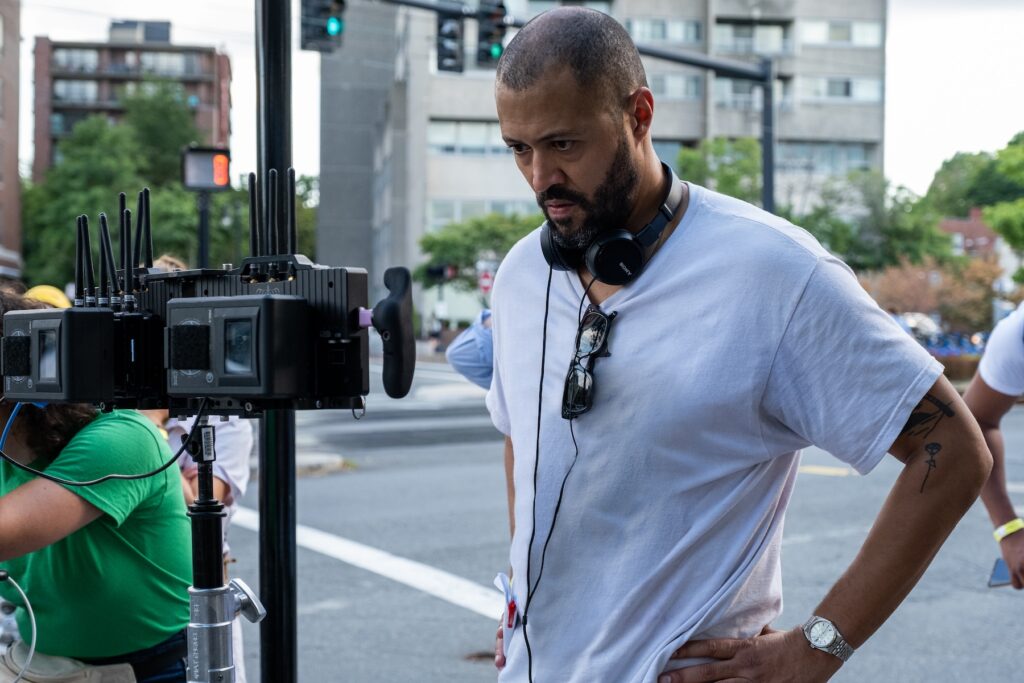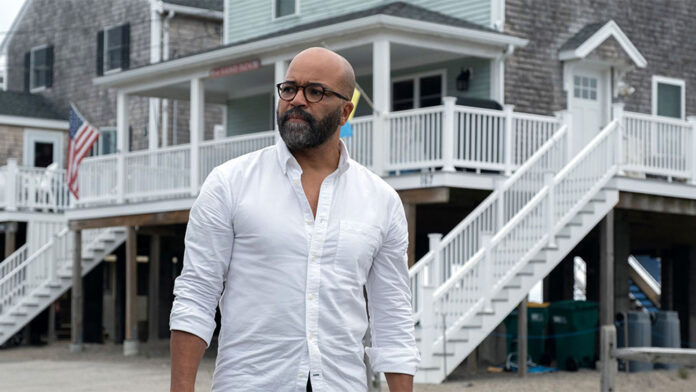Writer-director Cord Jefferson arrived at autumn’s Toronto International Film Festival with his debut feature American Fiction as an Emmy-winning TV writer (for a 2020 episode of Watchmen), whose credits include The Good Place and Master of None and a stint as a consultant on Succession. It’s an illustrious resume, but as a filmmaker, this turn in his career was still a question mark—one answered with a thunderous ovation at the film’s September 8 world premiere, followed at festival end with TIFF’s People’s Choice Award. It was the first of many film fest awards, including the Mill Valley Film Festival’s audience award, as well as five Film Independent Spirit Award nominations. Career transformation successfully achieved.
Jeffrey Wright stars in Jefferson’s adaptation of Percival Everett’s 2001 novel Erasure as Thelonious “Monk” Ellison, a cantankerous college professor and author of literary novels no one reads. Erudite in the TikTok era, he is already in the midst of a life crisis when critical praise and big sales greet a book titled We Lives in Da Ghetto. Told over and over again that his own books aren’t “Black” enough Monk is offended to his core by novelist Sintara Golden’s (Issa Rae) first-person narrative that plays into white editors’ expectations of Black experience. In a fury, he pens, under a pseudonym his own version of such a story called My Pafology, only to find his attempt at satire taken seriously by publishers eager to publish his formerly incarcerated alter ego.
The laughs keep coming in Jefferson’s film but beneath the comedy is a bitter truth, something that Jefferson has in common with Monk. Transitioning from TV scribe to feature filmmaker is not Jefferson’s first career turn. He began as a journalist and discovered that the color of his skin often dictated his assignments.
“The underlying message when you relegate Black stories, quote-unquote Black stories to being ones about slavery, or violence, or gangs or drugs are all of these things that we understand to be stereotypes. When you limit Black life to those kinds of stories, it suggests an inability to see Black people as complex and layered and nuanced human beings,” Jefferson said during an October visit to the Bay Area to screen American Fiction at the Mill Valley Film Festival and accept MVFF’s Breakthrough Directing Award.
“It’s an inability to see Black life as being a life that is similar to yours,” he added. “It’s an inability to understand Black people as being the same as you. To me, that was painful and it was like, “Well, is this really the best that we have to offer?”
Not that transitioning to television and screenwriting has been without its challenges. Jefferson has turned in scripts with Black characters, only to get back notes from executives and producers, saying the script needed to be “Blacker” and asking why the characters aren’t “Blacker.”
“The best way to shut that down is to ask, ‘What does ‘Blacker’ mean?’” Jefferson says. “’When you say, make this character ‘Blacker,’ what does that mean to you?’ They don’t respond because they know they are about to put their foot in their mouth, hugely.
“There’s far more to Black life than moments of tragedy and difficulty. Focusing on them constantly I think reinforces the idea that, ‘Their lives are different from mine and their lives are just full of misery and sadness.’ It feels almost like people want to create a spectacle as opposed to an actual story about what it is to be a human being.”

Jefferson became a fan of Jeffrey Wright when he caught his Emmy-winning turn in Mike Nichols’ 2003 miniseries adaptation of Tony Kushner’s 1993 plays Angels in America: Millennium Approaches and Angels in America: Perestroika (for which Wright also won a Tony Award). It pains him that the actor so often has been relegated to the role of sidekick, such as Gotham City Police Commissioner Jim Gordon to Batman and CIA Agent Felix Leiter to James Bond. When Jefferson began reading Erasure, it was Wright’s voice he heard in his head and the person he saw in the role when he envisioned making a movie out of the book.
Wright was the first person he showed his screenplay to, hoping that a performer who collaborates with auteurs like Nichols and Christopher Nolan and Wes Anderson might entertain working with a newbie director. “The fact that he was willing to take a risk on me, having never written a movie or directed anything, jumping aboard and saying, ‘OK, I’m trusting you in this process,’ that says a lot,” Jefferson said. “I don’t know that there are a lot of actors in his position who take these kinds of risks, because he doesn’t have to.
“That he did made everything easier. The financiers came up with more money. Other actors were interested because they wanted to work with Jeffrey Wright. The whole movie started to feel real in a way that didn’t feel real before. His willingness to take a risk means the world to me.”
Jefferson credits part of his success to resilience and an ability to persevere despite rejection. To him, that goes hand in hand with a creative life, a willingness to forge ahead and keep creating even in the face of a chorus of “nos.” Certainly, the payoff for him has been huge.
“When the producers greenlit this movie and told me they were going to make it, I started crying in the meeting because I had been told no over and over again,” Jefferson said. “I had been rejected so much that eventually I started thinking, ‘I don’t know if I’m ever going to get anything made on my own.’ Eventually, it worked out, but it took a lot. It was an uphill battle.”
American Fiction opens in Bay Area theaters Fri/22.






